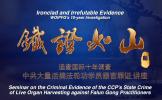WOIPFG’s Investigative Report on the Alleged Organ Harvesting of Living Falun Gong Practitioners at the PLA General Hospital (aka. the PLA No. 301 Hospital) and Its Staff Members Suspected of Participation
Preface
The PLA General Hospital has a huge real transplant volume and a dubious source of organs. It can provide multiple donors for one patient with a guaranteed liver replacement within a week. It also provides organs to local hospitals and can also select organs. In the general context of the CCP's state crime of live organ harvesting, the hospital is suspected of being involved in the crime of live organ harvesting of Falun Gong practitioners and other groups
I. Hospital Overview
The PLA General Hospital (301 Hospital) is the largest comprehensive hospital in the military, the PLA Medical College[1], and one of the country's important health care bases.[2] Founded in 1953, 301 Hospital is a large modern comprehensive hospital that integrates medical treatment, health care, teaching and scientific research. The hospital is an important health care base for the Central Committee of the Communist Party of China, and it is charged with the tasks of providing medical care to officers and soldiers with the military commission and general departments, and diagnosing and treating difficult diseases referred or sent by various military regions. The hospital is also a PLA medical school, with postgraduate education as the main focus, and is the only hospital-run school unit in the army.[3]
The International Medical Center of the hospital is a health care base for high-level CCP officals, and has long been responsible for the health care of the leaders of the Central Committee of the Communist Party of China, the Central Military Commission and the general departments, as well as the leaders of the military regions and some senior level cadres. The International Medical Center of PLA General Hospital is under the Clinical Department of the South Building. Located in the southwest side of the General Hospital, the center is a 7-story modern building with a total construction area of 20,000 square meters.[4]
II. The large transplantation department and its fast development
The hepatobiliary surgery department of the hospital is the largest hepatobiliary surgery center in North China, with a first-class liver transplantation center, and is a research institute of hepatobiliary surgery of the whole army, a national key discipline, a hepatobiliary surgery hospital of the PLA General Hospital, and a research department and a key laboratory of the army. [5]
1. The hospital hepatobiliary surgery is the hepatobiliary surgery research institute of the military, national key disciplines, with the army’s key laboratory, and the army’s "the most important" developing disciplines
The Hospital’s Liver Transplant Center is a first-class liver transplant center with multidisciplinary interaction developed and established on the basis of the General Hospital’s Hepatobiliary Surgery Department. The center also undertakes liver transplantation and hepatobiliary surgery health care tasks for leaders at the central, provincial, ministerial and army commander and above levels.[6]
In March 2006, the PLA General Logistics Department and the PLA General Hospital, in order to strengthen central health care and accelerate the development of the center's liver transplantation, specially transferred liver transplantation expert, the Third Military Medical University Southwest Hepatobiliary Surgery Hospital President Dong Jiahong to 301 Hospital as director of the Liver and Biliary Surgery Liver Transplantation Center, and the PLA General Hospital Hepatobiliary Surgery Hospital President. Following Dong Jiahong’s transfer to 301 Hospital, the hospital's liver transplantation developed extremely fast.[7]
2. The hardware of the transplantation department continues to expand
According to the official website of 301 Hospital in 2016, the Department of Urology, currently divided into four wards, has 140 beds.[8] The hospital's Hepatobiliary Surgery Department now has five wards: liver, biliary tract, pancreas, liver transplantation and minimally invasive surgery, and intensive care, with 172 unfolded beds. The hepatobiliary surgery department has no less than 5-8 surgeries per day. Given the current ward constraints, it is difficult to better arrange for more difficult patients to be hospitalized in time for surgery.[9] Back in 2007, according to Xinhua News Agency, the hospital was stepping up the construction of a new ward building, which was estimated to expand the hepatobiliary surgery department to more than 200 beds by the end of the year.[10]
3. Contact and exchange visits with many international organ transplantation institutions
The Hepatobiliary Surgery Department of the hospital is the Hepatobiliary Surgery Center of the Chinese People's Liberation Army. The liver transplantation center of the hospital has been in regular exchange visits and academic exchanges with internationally renowned institutions such as the University of Paris XI Hepatobiliary Center in France, Starzl TE Transplantation Institute of Pittsburgh Medical Center in the United States, National Liver Transplantation Center of the University of Melbourne in Australia and the Department of Hepatobiliary and Pancreatic Surgery of the University of Hong Kong.[11] Professor Wu Mengchao, Professor Wang Zhengguo, Professor Cheng Tianmin, Professor Tang Zhaoyou, Professor Cheng Shusen, Professor Liu Yunyi (Hong Kong), Professor Fan Shangda (Hong Kong) and Professor Chen Zhaolong (Taiwan) , all internationally well known in hepatobiliary surgery, were hired as honorary professors of the department.[12]
III The hospital participated in the Beijing Organ Transplant Matching Center
Beijing Organ Transplant Matching Center is composed of Beijing Friendship Hospital, 301 Hospital of the People's Liberation Army, Beijing Chaoyang Hospital, China-Japan Friendship Hospital and Peking Union Medical College Hospital, which are affiliated with the Central Ministry of Health, Chinese Academy of Medical Sciences, PLA and Beijing 4 major systems, to realize kidney transplant networking and kidney sharing, and to achieve unified and rapid information exchange and transmission among the hospitals participating in the networking.[13]
The urology department of the hospital is well-equipped and advanced. It has a transplant center and a renal transplant hemodialysis unit.[14] The hospital claims that its renal transplant technology is always at the leading level in China.[15]
IV. The hospital has a strong team of liver and kidney transplant doctors, which shows that the hospital's real transplant volume is huge.
According to the hospital's official website in 2016, urology has 29 doctors, 34 nursing and technical staff, including 14 senior titles, 2 doctoral supervisors, 3 master's supervisors. The department's kidney transplantation technology is always at the leading level in China.[16]
The Hospital's Hepatobiliary Surgery Department is the largest hepatobiliary surgery center in North China, with one academician, eight doctoral and master's supervisors, and 24 senior title staff, more than 80% of whom have doctoral degrees.[17] Multiple liver and kidney transplant teams can be formed. See the list of responsible persons.

Figure 1 Snapshot of PLA 301 Hospital Website
V. Plenty of organ donors
1. PLA General Hospital provides organs for local hospitals, and the organs provided can be selected for the best match
Yiyang City People's Hospital kidney transplantation department said: "We have the full cooperation from the general hospital of the People's Liberation Army and the First Military Medical University Hospital kidney transplantation center. We select the best kidney. We conduct a comprehensive examination of the donor kidney in advance, and exercise strict control to ensure the most appropriate donor kidney selected."[18]
2.The hospital can provide multiple donors for one patient
Field investigation: Beijing 301 Hospital kidney patients said that there’s a patient who, after receiving kidney transplant surgery, found the organ was not functioning well. So it was taken out and another kidney was transplanted. And this second one was not working well either, so the doctor immediately found a third one. So a total of three kidneys were used for this one patient.”[19]
3. The hospital organ transplantation surgery is frequent
According to some of the medical staff at the operating room of the PLA 301 General Hospital in Beijing, organ transplants are their most frequent and common, almost every day, so the medical staff there actually see and consider organ transplants, such a big operation, as a very simple matter. And the army authorities often told medical staff at meetings not to divulge the matter to the public.[20]
4.The hospital guarantees a liver replacement within a week
Investigation clues: Beijing 301 Hospital guarantees to replace the liver within a week
I am from Zhengzhou, a friend of a colleague of mine has liver cancer and needs a liver replacement. In the middle of July, he was hospitalized in Beijing 301 Hospital, and the doctors there guaranteed that the liver could be replaced within a week, and the cost was 350,000 yuan. Since the doctor could guarantee to replace the liver within one week, so my colleagues said that it was unbelievable. This shows that the hospital has a huge human organ bank of living donors.[21]
VI. List of responsible persons.
JFJZ001 Dong Jiahong, male. Place of birth: Huai'an City, Jiangsu Province. Date of birth March 8, 1960.
Biography: Director of Liver Transplantation Center. Fellow of the American College of Surgeons (FACS), Standing Member of the International Society of Gastroenterology and Surgery, Vice President of the International Society of Hepatobiliary and Pancreatic Surgery, China, Standing Member of the Chinese Society of Surgery, Standing Member of the Chinese Society of Organ Transplantation, Director of Biliary Surgery of the Chinese Society of Surgery, former Director of Hepatobiliary Surgery of the PLA General Hospital, Doctoral Supervisor, the director of the Southwest Hepatobiliary Surgery Hospital of the Third Military Medical University, the director of the National Key Discipline of General Surgery of the Third Military Medical University, and the professor, special professor and doctoral supervisor of many famous universities such as Nankai University and Shandong University. Executive Director of Tsinghua Changgeng Hospital in Beijing.[22]
From 2006.1 to 2013.12, he served as the director of the Department of Hepatobiliary Surgery of Beijing 301 Hospital and the All Army Institute of Hepatobiliary Surgery. Now he is the Executive President of Tsinghua Chang Gung Hospital in Beijing, Chairman of the Academic Committee, Professor and Doctoral Supervisor, specializing in precision surgical treatment of hepatobiliary and pancreatic diseases, and liver transplantation. On November 27, 2017, he was elected as a member of the Chinese Academy of Engineering.
He has long been engaged in the clinical treatment of liver transplantation and hepatobiliary surgical diseases. He has completed more than 700 cases of various clinical liver transplantation such as living partial liver transplantation and split liver transplantation under his main supervision.[23]
He has implemented a serial management model of liver transplantation, perioperative management and long-term post-transplant follow-up, focusing on long-term survival outcomes after liver transplantation.
JFJZ002 Lu Shi-Chun, Male.
Biography: Postdoctoral and doctoral supervisor, chief physician, professor, famous hepatobiliary surgery specialist. He is the Director of Hepatobiliary Surgery in the Clinical Department of Surgery of the General Hospital of the Chinese People's Liberation Army. He is a member of the editorial board of Chinese Journal of Surgery, Chinese Journal of Hepatobiliary Surgery, Chinese Journal of Organ Transplantation and other ten domestic and international journals.
In 2004, he was introduced by the West China Hospital of Sichuan University to Beijing Youan Hospital of Capital Medical University as the director of the Hepatobiliary Surgery and Liver Transplantation Center and the Sino-US Liver Transplantation Collaboration Center. He is currently the Director of the Department of Hepatobiliary Surgery, Clinical Department of Surgery, General Hospital of the Chinese People's Liberation Army.
He received his PhD in abdominal surgery and organ transplantation from Freiburg University in Germany from 1992 to 1995.
During his tenure, he has performed more than 700 liver transplants (including adult and pediatric living liver transplants) and more than 2,000 other major hepatobiliary and pancreatic surgeries. He is involved in hepatobiliary surgery for benign and malignant diseases, end-stage liver disease and liver transplantation for acute liver failure. His main research interests are hepatobiliary diseases, transplantation and clinical immunology.[24]
JFJZ003 Kai Jiang, Male.
Biography: Director of Hepatobiliary, Pancreatic and Splenic Surgery, The First Affiliated Hospital of PLA General Hospital; Administrative Deputy Director of Hepatobiliary Surgery, PLA General Hospital.
He studied under the famous hepatobiliary surgery expert in China, Academician Huang Zhiqiang. He studied living liver transplantation at the Queen Mary Hospital of the University of Hong Kong (Prof. S.T. Fan) and European experience in liver cancer treatment at the Clinic of the University of Barcelona (Prof. J.M. Llovet and J. Bruix).
Clinical and experimental research in hepatobiliary and pancreatic surgery, supervisor of the master's degree at the PLA Medical School.[25]
JFJZ004 Ao Jianhua, female. Date of birth: 1953.[26]
Biography: Chief Physician (Professor) of Urology, member of the All Army Organ Transplantation Committee, Member at Deputy Director level of the Organ Transplantation Committee of the Beijing Branch of the Chinese Medical Association. Editorial board member of Chinese Journal of Organ Transplantation.
She graduated from the Second Military Medical University and studied renal transplantation and hemodialysis at Lund University Hospital in Sweden. She has been practicing in the above-mentioned specialties since 1982 and is mainly responsible for kidney transplant tissue matching, perioperative and postoperative anti-rejection follow-up, and related hemodialysis work. She has been at her work for over 25 years.[27]
JFJZ005 Dong Jun, Male.
Biography: MD in Urology, Chief Physician, Associate Professor. He is a young member of Chinese Organ Transplantation Committee Beijing Branch.
He graduated from the Second Military Medical University with a Bachelor of Medicine degree in 1986, graduated from the Military Medical Training College with a Master of Medicine degree in 1991, and graduated from Peking University Medical School with a Doctor of Medicine degree in 2005.
From October 1997 to October 1999, he was sponsored by the State Education Commission to study in the United Kingdom for two years, working and studying at King's College, University of London, where he conducted basic research on kidney transplantation. In 2005, he received training in urological oncology techniques at Norris Oncology Center, University of Southern California, USA. In the same year, he was trained in the clinical aspects of kidney transplantation at the University of Wisconsin Medical School, USA.
Since 1996, he has independently performed more than 500 kidney transplants (including living relative donor kidney transplants). As the attending physician, he is fully in charge of kidney transplantation in the Department of Urology, PLA General Hospital.[28]
JFJZ006 Cai Wei, Male. Date of birth: 1956.
Personal Profile: Chief Physician of Urology (Professor)
Graduated from China Medical University in 1983, he became a surgeon at the PLA General Hospital, and in 1985 began to specialize in urology.
He specializes in surgeries in autologous kidney transplantation and allogeneic kidney transplantation.[29]
JFJZ007 Jinshan Lu, Male.
Personal Profile: Deputy Chief Physician
He graduated from the Second Military Medical University in 1990, focusing on clinical work in genitourinary system diseases and kidney transplantation. In 1999, he went to the National Institute of Nephrology (General Hospital of Nanjing Military Region) to study under Academician Leishi Lai and Professor Huiping Chen for renal pathology research, focusing on transplanted kidney puncture biopsy and pathological diagnosis techniques.
He has also worked on kidney transplantation and related surgeries; post-transplantation immunosuppressive drug adjustment and diagnosis and treatment of recent and long-term complications and difficult diseases.[30]
FJZ008 Zhang Xu, Male.
Biography: Director of the Department of Urology, General Hospital of the Chinese People's Liberation Army, Professor, Chief Physician, Master and Doctoral Supervisor
He graduated from Tongji Medical University (now Tongji Medical College of Huazhong University of Science and Technology) in 1983, received his master's degree in 1989 and stayed in Wuhan Tongji Hospital, studied at Heidelberg University Surgical Hospital in Germany as a visiting scholar in surgery from 1999 to 2000, was promoted to professor, chief physician and qualified as master's supervisor in 2000, became deputy director of urology department in Tongji Hospital in 2001. He received his M.D. degree in 2002 and Ph.D. supervision in 2003, and was transferred to the Chief of Urology Department of PLA General Hospital in 2008.
From 1999 to 2000, he went to Germany to study at the University Hospital of Surgery in Heidelberg as a visiting scholar in surgery.[31]
JFJZ009 Song Tao, Male.
Biography: Chief physician and professor of urology at the General Hospital of the Chinese People's Liberation Army.
He graduated from the First Military Medical University in 1988, and started his specialty in urology at the PLA General Hospital in the same year. After 1997, he also engaged in clinical research in men’s medicine; he received his clinical doctorate degree from Beijing University. [32]
Specialized in kidney transplantation.[33]
FJZ010 He Xueyou, Male.
Profile: Deputy Chief Physician, Department of Urology, PLA General Hospital
Graduated from the Fourth Military Medical University with a bachelor's degree.[34]
Specialized in kidney transplantation.[35]
JFJZ011 Li Yantang, Male. Date of birth: June 16, 1932.
Biography: Chief Physician (Professor) of PLA General Hospital, Standing Member of Chinese Society of Urology and Chinese Society of Organ Transplantation, Vice Chairman of Urology Society and member at director level of Organ Transplantation Society of Chinese Medical Association Beijing Branch. He is also a member of the European Society for Organ Transplantation and graduated from Harbin Medical University in 1956.
Fellowship in Urology, Harvard Medical School, USA, Postdoctoral Fellowship, Baylor College of Medicine, Houston, USA.
Kidney transplantation.[36]
JFJZ012 Xiaoxiong Wang, Male.
Profile: Member of the expert group of the General Hospital of the Chinese People's Liberation Army, chief physician of urology, professor, doctoral supervisor. He is currently a consultant of the National Military Urology Committee and an expert of the Central Health Care Consultation. He is a standing member of the Committee of Urology Branch of Chinese Physicians Association, Standing member on the Editorial Committee of Chinese Journal of Urology, Special member on the Editorial Committee of Chinese Journal of Surgery and Chinese Medical Journal, Honorary Member of the 8th Science and Technology Committee of PLA General Hospital, Expert of National and Military Drug Review Bank, Member of International Association of Urology.
He has long been engaged in medical care for the heads of the Central Government and the Central Military Commission.
From September 1983 to December 1984, he was engaged in bladder cancer research at Kyoto National University, Japan.[37]
From October 1977 to December 2004, he participated in the implementation of 1804 cases (2037 cases) of kidney transplantation performed in this hospital.[38]
JFJZ013 Lei Zhang, Male.
Biography: Chief Physician, PLA General Hospital
Graduated from Baiqiu'en Medical University.[39]
From October 1977 to December 2004, he participated in the implementation of 1804 cases (2037 cases) of kidney transplantation performed in this hospital.[40]
JFJZ014 Yong Yang, Male.
Personal Profile: Deputy Chief Physician, PLA General Hospital
From October 1977 to December 2004, he participated in the implementation of 1804 cases (2037 cases) of kidney transplantation performed in this hospital.[41]
JFJZ015 Yanbin Wang, male.
Biography: Deputy Chief Physician of Hepatobiliary Surgery, Assistant to the Director of the National Institute of Field (Hepatobiliary) Surgery (Academician Huang Zhiqiang), Assistant to the Director of the Hepatobiliary Surgery Hospital of the PLA General Hospital (Dong Jiahong).
He graduated from the First Military Medical University of the PLA in 1986 with a bachelor's degree in medicine, and from the PLA Military Medical College in 2002 with a doctorate degree in medicine.
He is engaged in perioperative management and surgery of liver transplantation.[42]
JFJZ016 Xianjie Shi, male. Date of birth: March, 1966.
Biography: Chief physician of Hepatobiliary Surgery of PLA General Hospital, professor, director of Hepatobiliary Ward, doctoral supervisor, concurrently director of Hepatobiliary Surgery of the First Affiliated Hospital of PLA General Hospital, secretary of the Party branch.
From August 1983 to July 1989 he was in a 6-year program at the Department of Military Medicine, Fourth Military Medical University, and got his Bachelor's degree.
During his work at PLA General Hospital, he was the first to carry out allogeneic liver transplantation in 2000, and has carried out a total of 500 cases including living liver transplantation to date.[43]
He’s good at liver transplantation related technique.[44]
JFJZ017 Wei-Dong Duan, Male.
Biography: Deputy Chief Physician of Hepatobiliary Surgery, PLA General Hospital
Between January 2002 and January 2009, he participated in performing 326 in situ liver transplants and 250 donor excisions with donor heat ischemia time within 8min.[45]
JFJZ018 Jianjun Leng, Male.
Biography: Deputy Chief Physician, Associate Professor, MD, All Army Hepatobiliary Surgery Institute, Hepatobiliary Surgery Hospital, General Hospital of the Chinese People's Liberation Army
From August 1989 to July 1999, he worked in the Department of Hepatobiliary Surgery, Xijing Hospital of the Fourth Military Medical University. He worked as a resident, chief resident, attending physician, and lecturer. In 1999, he studied gene protein expression and gene therapy of hepatocellular liver cancer and the technique of living liver transplantation under the supervision of Prof. Kaizong Li and Prof. Kefeng Dou in the Hepatobiliary Surgery Department of the First Hospital of the Fourth Military Medical University.
He specializes in surgical treatment of hepatobiliary, pancreatic and splenic diseases, especially pancreatic cancer, bile duct cancer, obstructive jaundice, selection of liver transplantation indications, liver transplantation surgery and postoperative management.[46]
JFJZ019 Wenbin Ji, male. Date of birth: 1965.
Profile: Deputy Chief Physician of Hepatobiliary Surgery
From August 1999 to January 2002 he was doing postdoctoral work in Hepatobiliary Surgery, PLA General Hospital, under the guidance of Academician Zhiqiang Huang, he was engaged in basic and clinical research on techniques related to perioperative management of liver transplantation and transplantation immune tolerance.[47]
He participated in the first liver transplant in 2000 at the PLA General Hospital, and has participated in and performed more than 400 liver transplants including pro-transplantation, re-transplantation, combined liver and kidney transplantation, volume reduction transplantation, split liver transplantation, and other types of liver transplantation.[48]
JFJZ020 Yurong Liang, Male.
Profile: Deputy Chief Physician, Associate Professor of Hepatobiliary Surgery, PLA General Hospital
From August 2002 to July 2003, he was an attending physician and lecturer at Hepatobiliary Surgery Department, PLA General Hospital.
From January 2002 to January 2009, he was involved in performing 326 in situ liver transplants and 250 donor resections, with donor heat ischemia time within 8min.[49]
He specialized in rejection and perioperative treatment after liver transplantation.[50]
JFJZ021 Zhiming Zhao, Male.
Biography: Chief physician of Hepatobiliary and Pancreatic Oncology Surgery, PLA General Hospital, M.D.
From July 2011 to the present, Chief Physician, Professor, Director of Hepatobiliary Ward, Doctoral Supervisor, Director of Hepatobiliary Surgery, Party Branch Secretary, the First Affiliated Hospital of PLA General Hospital.
From August 1983 to July 1989, he was in a 6-year Bachelor's Degree program, Department of Military Medicine, Fourth Military Medical University.
He specializes in liver transplantation.[51]
JFJZ022 Ying Luo, Male.
Profile: Associate Professor, Deputy Chief Physician, All Army Hepatobiliary Surgery Institute, PLA General Hospital
From August 1989 to July 1999, he worked in the Department of Hepatobiliary Surgery, Xijing Hospital of the Fourth Military Medical University. He worked as a resident, chief resident, attending physician, and lecturer. In 1999, he studied gene protein expression and gene therapy of hepatocellular liver cancer under the supervision of Prof. Kaizong Li and Prof. Kefeng Dou at the Hepatobiliary Surgery Department of the First Affiliated Hospital of the Fourth Military Medical University, and received his Ph.D.
Between January 2002 and January 2009, he participated in performing 326 in situ liver transplants and 250 donor excisions with donor heat ischemia time within 8 min.[52]
He specializes in liver transplantation for hepatitis B-related liver disease, and prevention and treatment of biliary complications after liver transplantation.[53]
JFJZ023 Zhiqiang Huang, Male.
Biography: Chief Physician (Professor and Researcher) of Hepatobiliary Surgery, PLA General Hospital, Professor of Surgery, PLA General Hospital, Military Medical Training College, Doctoral Supervisor, Chairman of Science and Technology Committee of Military Medical Training College, Director of Institute of General Surgery, Senior Member of Chinese Medical Association, Member of International Surgical Association, Advisor of Editorial Board of Chinese Journal of Surgery, Advisor of Chinese Surgical Committee, Chinese Surgical
From August 1999 to January 2002, he was a clinical postdoctoral fellow in the Department of Hepatobiliary Surgery of the PLA General Hospital. He conducted basic and clinical research on perioperative management of liver transplantation and transplantation immune tolerance under the supervision of Academician Zhiqiang Huang. He finished his work as a postdoc fellow and started to work as assistant to director of Liver Transplantation.[54]
JFJZ024 Yifei Huang, Male. Date of birth: 1956.
Biography: Professor and Chief Physician of Ophthalmology, PLA General Hospital, Doctoral Supervisor, enjoys national government special allowance.
From August 2003 to June 2011, he was Deputy Chief Physician and Associate Professor of Hepatobiliary Surgery, PLA General Hospital, Assistant Director of Liver Transplantation Center, PLA General Hospital, and Master's Degree Supervisor.[55]
Skilled in various surgical techniques in ophthalmology, such as: corneal transplantation, ocular surface reconstruction (including corneal rim stem cell transplantation, amniotic membrane transplantation), etc.
JFJZ025 Liqiang Wang, female. Date of birth: 1971.
Profile: Deputy Chief Physician of Ophthalmology, PLA General Hospital
From July 2011 to the present, Chief Physician of Hepatobiliary Surgery, Professor, Director of Hepatobiliary Ward, Doctoral Supervisor, and Director of Hepatobiliary Surgery, Party Branch Secretaryof the First Affiliated Hospital of PLA General Hospital.
From April 2002 to July 2002, she studied in Hepatobiliary and Pancreatic Surgery, Queen Mary Hospital, University of Hong Kong.
During her work at PLA General Hospital, she was the first to carry out allogeneic liver transplantation in 2000, and has carried out a total of 500 cases including living liver transplantation to date.[56]
She is skilled in various surgical techniques in ophthalmology, such as corneal transplantation, artificial cornea implantation, cataract ultrasound emulsification combined with IOL implantation, ocular surface reconstruction, etc.
JFJZ026 Kun Zhang, Male. Date of birth: 1970.
Biography: Deputy Chief Physician of Ophthalmology, PLA General Hospital
Corneal transplantation.[57]
Reference:
[1]Brief Introduction to the General Hospital of the People’s Liberation Army of China Date of Issuance: 04/07/2005
http://www.301hospital.com.cn/web/shownews/vyyjs/8.html
Link to WOIPFG files:
http://www.zhuichaguoji.org/cn/images/nationalcriminalreports/642.pdf
[2]Brief Introduction to Urology Surgery of the General Hospital of the People’s Liberation Army of China
http://www.301hospital.com.cn/web/ksabout/71.html
Link to WOIPFG files:
http://www.zhuichaguoji.org/sites/default/files/report/2016/64700_06210…
[3] Brief Introduction to the General Hospital of the People’s Liberation Army of China
https://web.archive.org/web/20160113021032/http:/www.301hospital.com.cn/web/article/yygk/yyjj.html
[4]High-end Medical Institution: International Medical Center of the PLA General Hospital (301 Hospital)
https://web.archive.org/web/20160529094420/http://blog.sina.com.cn/s/blog_b150514f01016bfa.html
[5]Brief Introduction to Hepatobiliary Surgery of the General Hospital of the People’s Liberation Army of China
http://www.301hospital.com.cn/web/showsection/65.html
Link to WOIPFG files:
http://www.zhuichaguoji.org/cn/images/nationalcriminalreports/643.png
[6] China Organ Transplantation Network November 14, 2011: "Liver Friends Meeting", Conveying Warmth and Strength The First Liver Friends Meeting of PLA General Hospital
http://www.transplantation.org.cn/ZJieFangJunZongYiYuanKuaiXun/2011-11/5944.htm
Link to WOIPFG files:
http://www.zhuichaguoji.org/sites/default/files/report/2016/64700_06210…
[7]China Organ Transplantation Network February 14, 2011: Introduction to the Liver Transplant Center of PLA General Hospital
http://www.transplantation.org.cn/ZJieFangJunZongYiYuanKuaiXun/2011-02/5055.htm
Link to WOIPFG files:
http://www.zhuichaguoji.org/sites/default/files/report/2016/64700_06210…
[8]Brief Introduction to Urology Surgery of the General Hospital of the People’s Liberation Army of China
http://www.301hospital.com.cn/web/ksabout/71.html
Link to WOIPFG files:
http://www.zhuichaguoji.org/sites/default/files/report/2016/64700_06210…
[9]Brief Introduction to Hepatobiliary Surgery of the General Hospital of the People’s Liberation Army of China
https://web.archive.org/web/20160113021128/http://www.301hospital.com.cn/web/ksabout/65.html
[10]The Fighting Team of Hepatobiliary Surgery, Xinhua.com July 10, 2007
[11]The Fighting Team of Hepatobiliary Surgery, Xinhua.com July 10, 2007
[12]Brief Introduction to Hepatobiliary Surgery of the General Hospital of the People’s Liberation Army of China
https://web.archive.org/web/20160113021128/http://www.301hospital.com.cn/web/ksabout/65.html
[13]Chinese Clinical Medicine, Vol. 2, No. 1, 2001: The establishment and necessary conditions for the successful operation of the Beijing Organ Transplantation Matching Center by Zhexian Li, Xiujiang Er, Kun Yu, Weiran Ma, Jie Lu, Yuhai Zhang, Baoxiang Jia, Junjie Wu, Rumei Bi, Zhu Xue, Yawang Tang, Zelin Xie (Beijing Friendship Hospital, Capital Medical University).
Link to WOIPFG files:
http://www.zhuichaguoji.org/sites/default/files/report/2016/64700_06210…
http://www.zhuichaguoji.org/sites/default/files/report/2016/64700_06210…
[14]Brief Introduction to Urology Surgery of the General Hospital of the People’s Liberation Army of China
http://www.301hospital.com.cn/web/ksabout/71.html
Link to WOIPFG files:
http://www.zhuichaguoji.org/sites/default/files/report/2016/64700_06210…
[15]Brief Introduction to Urology Surgery of the General Hospital of the People’s Liberation Army
of China
http://www.301mnwk.com/slyymnks/bzfl/syz/index.html
Link to WOIPFG files:
http://www.zhuichaguoji.org/cn/images/nationalcriminalreports/644.png
[16]Brief Introduction to Urology Surgery of the General Hospital of the People’s Liberation Army of China
http://www.301hospital.com.cn/web/ksabout/71.html
Link to WOIPFG files:
http://www.zhuichaguoji.org/sites/default/files/report/2016/64700_06210…
[17]Brief Introduction to Hepatobiliary Surgery of the General Hospital of the People’s Liberation Army of China
http://www.301hospital.com.cn/web/showsection/65.html
Link to WOIPFG files:
http://www.zhuichaguoji.org/cn/images/nationalcriminalreports/643.png
[18]Introduction to the Renal Transplant Department of Yiyang People's Hospital, "Good Doctor Online
http://www.haodf.com/faculty/DE4r08xQdKSLBg0GU2Y2Krrpb6FW/jieshao.htm
Link to WOIPFG files:
http://www.zhuichaguoji.org/cn/images/nationalcriminalreports/141.pdf
[19]Live video of 301 Hospital
https://twitter.com/YuMing1999720/status/1292249773169246208
[20] Investigation Lead: Frequent Organ Transplants at Beijing PLA General Hospital
https://www.minghui.org/mh/articles/2014/2/6/%E8%B0%83%E6%9F%A5%E7%BA%B…
[21]Investigation lead from Minghui.com: Beijing 301 Hospital guarantees liver replacement within a week
https://zhenxiang.biz/40091.html
[22]Baidu Encyclopedia: Profile of Dong Jiahong
[23]China Organ Transplantation Network: Introduction to the Liver Transplant Center of PLA General Hospital, [Date: 2011-02-14]
http://www.transplantation.org.cn/ZJieFangJunZongYiYuanKuaiXun/2011-02/…
https://web.archive.org/web/20140417224135/http://www.transplantation.o…
[24]PLA General Hospital Famous Doctors Lu Shichun
http://www.301hospital.com.cn:80/web/showexp/myhcv/65/353.html
https://web.archive.org/web/20160815052557/http://www.301hospital.com.c…
[25]PLA 304 Hospital - Hepatobiliary Surgery
http://www.pla304.cc/304hospital/gdwkzxjj/81.jhtml#position
[26]Good Doctors Online: Profile of Ao Jianhua
https://draojianhua.haodf.com/
[27]The PLA General Hospital: Profile of Ao Jianhua
http://www.301hospital.com.cn/web/showexpertintro/71/241.html?height=40…
https://web.archive.org/web/20120816043306/http://www.301hospital.com.c…
[28] PLA General Hospital Profile of Dong Jun
http://www.301hospital.com.cn/web/showexpertintro/71/247.html?height=40…
https://web.archive.org/web/20121104224259/http://www.301hospital.com.c…
[29]PLA General Hospital Profile of Cai Wei
http://www.301hospital.com.cn/web/showexpertintro/71/404.html?height=40…
https://web.archive.org/web/20121021032729/http://www.301hospital.com.c…
[30]PLA General Hospital Profile of Lu Jishan
http://www.301hospital.com.cn/web/showexpertintro/71/723.html?height=40…
https://web.archive.org/web/20120817024119/http://www.301hospital.com.c…
[31]PLA General Hospital Profile of Zhang Xu
http://www.301hospital.com.cn/web/showexpertintro/71/720.html?height=40…
https://web.archive.org/web/20121104224238/http://www.301hospital.com.c…
[32]Song Tao, specialist with Urology Surgery of the General Hospital of the People’s Liberation Army of China
http://www.301hospital.com.cn/web/showexpertintro/71/250.html?height=40…
[33]Medwon.com: Brief Introduction to Urology of 301 Hospital
http://hpt4294968369.h.yynet.cn/departments/?section_id=46342
[34] PLA General Hospital Profile of He Xueyou
http://www.301hospital.com.cn/web/showexpertintro/71/252.html?height=40…
https://web.archive.org/web/20120816043316/http://www.301hospital.com.c…
[35]Medwon.com: Brief Introduction to Urology of 301 Hospital
http://hpt4294968369.h.yynet.cn/departments/?section_id=46342
[36]PLA General Hospital Profile of Li Yantang
http://www.301hospital.com.cn/web/showexpertintro/71/230.html?height=40…
https://web.archive.org/web/20120816043256/http://www.301hospital.com.c…
[37]PLA General Hospital Profile of Wang Xiaoxiong
http://www.301hospital.com.cn/web/showexpertintro/71/232.html?height=40…
https://web.archive.org/web/20120817023833/http://www.301hospital.com.c…
[38]Chinese Journal of Transplantation (Electronic Edition) 2007, Vol. 1, No. 01 4-8 pp.
"Retrospective analysis of 2037 renal transplantation cases"
by Xiao Xuren, Ao Jianhua, Lu Jinshan, Hong Baofa, Ye Linyang, Zhang Lei, Cai Wei, Gao Jiangping, He Xueyou, Yang Yong, Dong Jun, Wang Xiaoxiong, Li Yantang, Xu Dianyi (Department of Urology, General Hospital of the Chinese People's Liberation Army, Beijing, 100853, China).
http://new.med.wanfangdata.com.cn/Paper/Detail?id=PeriodicalPaper_zhyzz…
[39]Zhang Lei, specialist with Urology Surgery of the General Hospital of the People’s Liberation Army of China
http://www.301hospital.com.cn/web/showexpertintro/71/239.html?height=40…
[40]Chinese Journal of Transplantation (Electronic Edition) 2007, Vol. 1, No. 01 4-8 pp.
"Retrospective analysis of 2037 renal transplantation cases"
by Xiao Xuren, Ao Jianhua, Lu Jinshan, Hong Baofa, Ye Linyang, Zhang Lei, Cai Wei, Gao Jiangping, He Xueyou, Yang Yong, Dong Jun, Wang Xiaoxiong, Li Yantang, Xu Dianyi (Department of Urology, General Hospital of the Chinese People's Liberation Army, Beijing, 100853, China).
http://new.med.wanfangdata.com.cn/Paper/Detail?id=PeriodicalPaper_zhyzz…
[41]Chinese Journal of Transplantation (Electronic Edition) 2007, Vol. 1, No. 01 4-8 pp.
"Retrospective analysis of 2037 renal transplantation cases"
by Xiao Xuren, Ao Jianhua, Lu Jinshan, Hong Baofa, Ye Linyang, Zhang Lei, Cai Wei, Gao Jiangping, He Xueyou, Yang Yong, Dong Jun, Wang Xiaoxiong, Li Yantang, Xu Dianyi (Department of Urology, General Hospital of the Chinese People's Liberation Army, Beijing, 100853, China).
http://new.med.wanfangdata.com.cn/Paper/Detail?id=PeriodicalPaper_zhyzz…
[42]PLA General Hospital Profile of Wang Yanbin
http://www.301hospital.com.cn/web/showexpertintro/65/610.html?height=40…
https://web.archive.org/web/20141109114642/http://www.301hospital.com.c…
[43]Medwon.com: Profile of Shi Xianjie, Hepatobiliary Surgery, 301 Hospital
http://shixianjie.u.yynet.cn/intro.php
[44]Medwon.com: Profile of Shi Xianjie, Hepatobiliary Surgery, 301 Hospital
http://shixianjie.u.yynet.cn/intro.php
[45] NATIONAL MEDICAL JOURNAL OF CHINA, Vol. 91, No. 04, 2011, pp. 251-255 "Etiology and prevention of ischemic biliary tract lesions after liver transplantation"
by Xin Jin, Xianjie Shi, Maoqiang Wang, Yukun Luo, Fengchun Cai, Yurong Liang, Ying Luo, Wenbin Ji, Weidong Duan, Jiahong Dong (Department of Hepatobiliary Surgery, General Hospital of the Chinese People's Liberation Army, Beijing, 100853, China).
http://new.med.wanfangdata.com.cn/Paper/Detail?id=PeriodicalPaper_zhyx2…
[46]Good Doctors Online: Profile of Dr. Leng Jianjun
http://www.haodf.com/doctor/DE4r08xQdKSLfxUlidBIFkeSa2ob.htm
https://web.archive.org/web/20140811213453/http://www.haodf.com/doctor/…
[47]Good Doctors Online: Profile of Dr. Ji Wenbin
http://www.haodf.com/doctor/DE4rO-XCoLU0KXHTQgjgKEL-rP.htm
https://web.archive.org/web/20140716122844/http://www.haodf.com/doctor/…
[48]Good Doctors Online: Profile of Dr. Ji Wenbin
http://www.haodf.com/doctor/DE4rO-XCoLU0KXHTQgjgKEL-rP.htm
[49]NATIONAL MEDICAL JOURNAL OF CHINA, Vol. 91, No. 04, 2011, pp. 251-255 "Etiology and prevention of ischemic biliary tract lesions after liver transplantation"
by Xin Jin, Xianjie Shi, Maoqiang Wang, Yukun Luo, Fengchun Cai, Yurong Liang, Ying Luo, Wenbin Ji, Weidong Duan, Jiahong Dong (Department of Hepatobiliary Surgery, General Hospital of the Chinese People's Liberation Army, Beijing, 100853, China).
http://new.med.wanfangdata.com.cn/Paper/Detail?id=PeriodicalPaper_zhyx2…
[50]Good Doctors Online: Profile of Dr. Liang Yurong
http://www.haodf.com/doctor/DE4r0BCkuHzduZY-c7flZMGILTrbd.htm
https://web.archive.org/web/20140829034622/http://www.haodf.com/doctor/…
[51]Good Doctors Online: Profile of Dr. Zhao Zhiming
http://www.haodf.com/doctor/DE4r0BCkuHzduCpWy7ej6dZX-ciU9.htm
https://web.archive.org/web/20140417224039/http://www.haodf.com/doctor/…
[52]NATIONAL MEDICAL JOURNAL OF CHINA, Vol. 91, No. 04, 2011, pp. 251-255 "Etiology and prevention of ischemic biliary tract lesions after liver transplantation"
by Xin Jin, Xianjie Shi, Maoqiang Wang, Yukun Luo, Fengchun Cai, Yurong Liang, Ying Luo, Wenbin Ji, Weidong Duan, Jiahong Dong (Department of Hepatobiliary Surgery, General Hospital of the Chinese People's Liberation Army, Beijing, 100853, China).
http://new.med.wanfangdata.com.cn/Paper/Detail?id=PeriodicalPaper_zhyx2…
[53]Chinese Journal of Gastrointestinal Surgery: Luo Ying
http://www.zhxhwk.com/bwmingdan.asp?fid=60&id=1352
[54]Huang Zhiqiang, specialist in hepatobiliary surgery, General Hospital of the Chinese People’s Liberation Army of China
http://www.301hospital.com.cn:80/web/showexpertintro/65/2.html?height=4…
https://web.archive.org/web/20141110010122/http://www.301hospital.com.c…
[55]Huang Yifei, ophthalmologist, General Hospital of the Chinese People's Liberation Army of China
http://www.301hospital.com.cn/web/showexpertintro/70/47.html?height=400…
https://web.archive.org/web/20120220033852/http://www.301hospital.com.c…
[56]Wang Liqiang, ophthalmologist, General Hospital of the Chinese People's Liberation Army of China
http://www.301hospital.com.cn/web/showexpertintro/70/62.html?height=400…
https://web.archive.org/web/20120220033909/http://www.301hospital.com.c…
[57]Zhang Kun, ophthalmologist, General Hospital of the Chinese People's Liberation Army of China
http://www.301hospital.com.cn/web/showexpertintro/70/684.html?height=40…
https://web.archive.org/web/20120220034508/http://www.301hospital.com.c…




























































